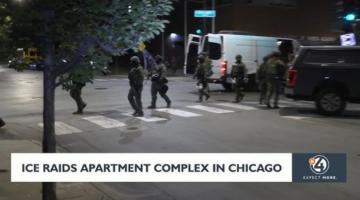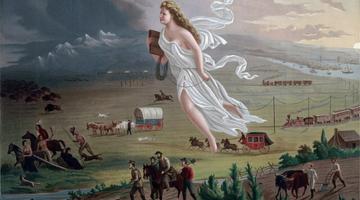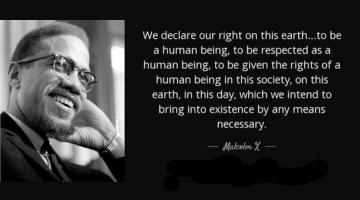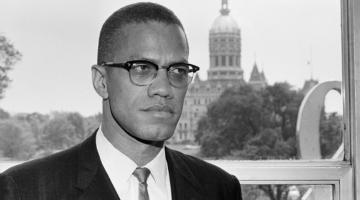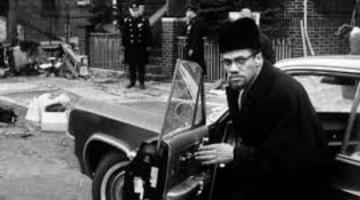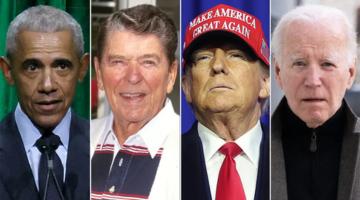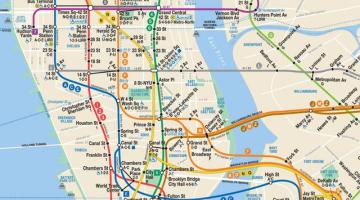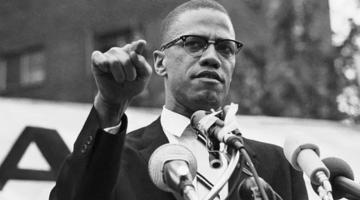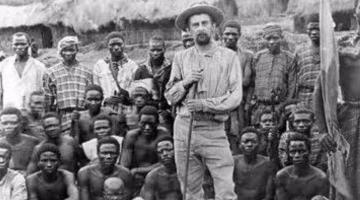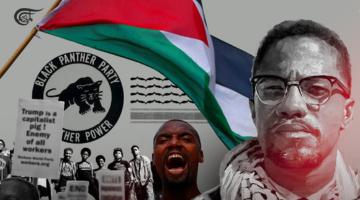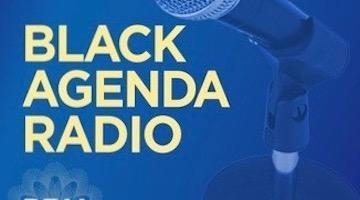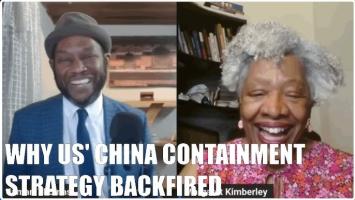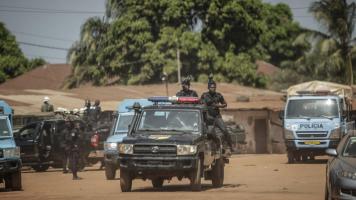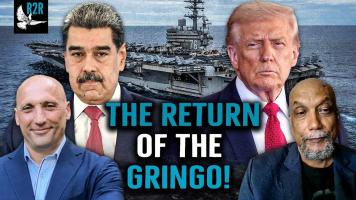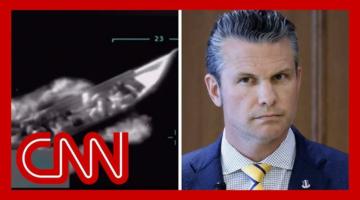Malcolm X didn’t just fight for Black liberation—he waged war on empire itself. As U.S. militarism tightens its grip on Africa and beyond, his revolutionary internationalism burns brighter than ever, exposing the ‘house Negroes’ who betray our struggle for a decolonized future.
White supremacist, patriarchal capitalist settler colonial imperialism dehumanizes the world. This dehumanization has met fierce constant resistance over time. Malcolm X stands out as one of our greatest warriors in the fight for Decolonization, Black power, Revolutionary Pan-Africanism and Internationalism, which have all been a part of the struggle to re-humanize us. This month, as we commemorate the 67th anniversary of African Liberation Day, the 77th anniversary of Nakba Day and the centenary of Malcolm's birth, we highlight some of his contributions.
Malcolm, understanding the ideological struggle as the most crucial struggle, always demanded that we think for ourselves. He always pointed out that the western press was one of the most powerful tools used to brainwash people into condoning the crimes of U.S. imperialism. In this regard Malcolm played a huge role in helping us to decolonize our thinking in many ways.
He told African/Black people in the U.S., “Because you can’t hate the roots of a tree and not hate the tree, you can’t hate your origin and not hate yourself, you can’t hate Africa and not end up hating yourself.” This is part of the struggle against internalized racism and oppression that Malcolm and others helped us wage because they understood that centuries of white supremacist patriarchal capitalism has created complexes in us that forms part of what Frantz Fanon called “germs of mental rot” that must be clinically detected and uprooted.
Malcolm said, “You can’t understand what is going on in Mississippi if you don’t understand what is going on in the Congo. And you can’t really be interested in what’s going on in Mississippi if you’re not also interested in what’s going on in the Congo. They’re both the same. The same interests are at stake. The same sides are drawn up, the same schemes are at work in the Congo that are at work in Mississippi. The same stake — no difference whatsoever.” Again he was helping us in our Pan-African Internationalist analysis.
This principle is also one that the Black Alliance for Peace (BAP) holds dear and is expressed through its Africa Team and the US Out of Africa Network Steering Committee and its U.S. Out of Africa: Shut Down AFRICOM campaign to get the US military out of the African continent.
AFRICOM is one of 11 US military combatant command centers that coordinate its military power covering all continents for the purpose of achieving full spectrum dominance. As usual, US imperialism never fails to use, as Malcolm would say, a few “house negroes” to do its dirty work thereby confusing and getting consent from some of our people by putting a Black face in leadership positions of its criminal war mongering. In the case of AFRICOM it is General Michael Langley who recently vilified one of Africa’s new hopeful anti-imperialist Pan-Africanists, Ibrahim Traore of Burkina Faso. In the case of SOUTHCOM it is Admiral Alvin Holsey who is also faithfully carrying out US military directives in the Americas in accordance with the 202-year-old Monroe doctrine, a criminal US policy of hemispheric neo-colonialism and domination.
We see this dynamic in the savage murder of brother Tyre Nichols, beaten to death by Black Memphis police who were acquitted, a 21st century example of Black overseers during the time of chattel slavery. During slavery on large plantations slave labor was directed by an overseer as sometimes the owner was absent. These overseers were usually white men but sometimes they were enslaved Africans/Blacks promoted to overseer or “driver”. The murderers of Tyre Nichols and the presence of the Michael Langleys of the world show that we still have those overseers and “drivers” among us today.
Although they’re a small percentage, the list of house negroes, overseers and compradors is unfortunately too long to list but if we are faithful to our revolutionary internationalist, Pan Africanist tradition, and in the tradition of Malcolm in particular we must continue to unmask them and call them out publicly. We have to understand that there are sometimes obvious, and sometimes not so obvious counterrevolutionary obstacles to our liberation and world peace. Our job is to engage in a struggle of ideas and values among our people that produces a culture where being a present day overseer, house negro or neo-colonial puppet is something to be detested and ashamed of.
Kwame Ture said that Malcolm was the first person he heard speak out against the war in Vietnam. Malcolm took a strong position against the draft at the time, likely leading to his good friend Muhammad Ali taking the same position and refusing to be drafted, thereby also refusing to become cannon fodder for US imperialist bloody crimes. By this courageous stance Muhammad Ali sacrificed his title and might have been imprisoned had the Supreme Court not overturned his draft evasion conviction.
Even before he broke with the Nation of Islam (NOI) Malcolm hosted a solidarity meeting with Fidel Castro in Harlem in 1960 and praised the Cuban revolution as a “real revolution.” It is again also reflective of the anti-imperialist solidarity that BAP exemplifies with anti-colonial people struggling for human rights in the Caribbean, South America and around the world. The Black Alliance for Peace Haiti Americas Team has continued strong solidarity and educational work building a Zone of Peace with the Community of Latin American and Caribbean States (CELAC) and People’s Centered Human Rights groups in nations such as Haiti, Cuba, Nicaragua, and Venezuela.
Malcolm gave a lecture at the London School of Economics less than two weeks before he was killed where he again showed his strong line on internationalism by lifting up the “spirit of Bandung” referring to the conference held in 1955 of African and Asian leaders in Bandung, Indonesia, who were unified in making an anti-colonial statement. Two of the leaders of this conference, presidents Gamel Abdel Nasser of Egypt and Jawaharlal Nehru of India went on to organize the Non-Aligned movement which eventually developed into the founding of the Tri-Continental Conference in revolutionary Cuba in 1966.
Malcolm understood that the concept of Human Rights was one used by the United Nations in their “Universal Declaration of Human Rights” and that in order for any grievance to be heard they have to be classified as human rights and not civil rights. As long as rights were considered “civil” they would remain in the jurisdiction of a particular government. This led Malcolm to take his grievance of human rights abuses suffered by African Americans to the 1964 meeting of the Organization of African Unity (OAU) on behalf of his Organization of African American Unity (OAAU) and African Americans so that the OAU could then take it to the UN. One of the objectives of the OAAU was to come up with a program to make our grievances international, thereby making them a problem of humanity and the world, and not merely of the U.S.
Malcolm's commitment to human rights reflects a revolutionary approach that transcends Western liberalism and centers anti-colonialism and revolutionary struggle to realize People(s)-Centered Human Rights. This is also a line that BAP has continued with the establishment of its North-South People’s centered Human Rights campaign.
It was also on his 1964 trip to Africa and the Middle East that Malcolm traveled to Palestine and during his stay in Egypt met the leaders of the Palestine Liberation Organization (PLO) who educated him on the history of Israeli Zionist settler colonialism, prompting him to advocate for the support of the Palestinian struggle against Israeli apartheid. He wrote an essay, Zionist Logic, and he once again led the way in helping us through his example of international solidarity to decolonize our thinking and actions.
Malcolm explained that in the U.S. the press and many people refer to this country as America and because of U.S. exceptionalism not acknowledging that America is a continent not a country. He goes on to talk about the important fact that there are more Black people in Brazil than there are in the U.S. and combined with all the other South American and Caribbean countries the force of the Black population united is a potential force against the Empire.
He also elaborated on Congo where he exposed the neo-colonial proxy killers of Patrice Lumumba like Moise Tshombe and Mobutu Sese Seko and explained that the US paid mercenaries who were committing mass murder dropping bombs on African villages but he said there was no outcry even from white liberals because they made it appear that it was a humanitarian project. He warned that,“They will do it to them today and do it to you tomorrow.” Malcolm was prophetic. History would record that 20 years after his death the Philadelphia police department under direction of the first Black mayor, dropped a bomb on the MOVE organization 40 years ago this month killing 6 adults and 5 children.
In conclusion, The Black Alliance for Peace follows in the tradition of the Black Radical anti-war movement which is absolutely needed if one agrees with Dr. King’s statement that the US is the greatest purveyor of violence in the world, and all thinking people do. According to The Black Alliance for Peace Principles of Unity, “Peace is not the absence of conflict, but rather the achievement by popular struggle and self-defense of a world liberated from the interlocking issues of global conflict, nuclear armament and proliferation, unjust war, and subversion through the defeat of global systems of oppression that include colonialism, imperialism, patriarchy, and white supremacy.”
Opposing the U.S. orchestrated war perpetrated domestically against Black, Latinx, indigenous and poor people through police terror, mass incarceration, and poverty and internationally with its over 800 military bases and its murderous economic sanctions is something that all peace loving people should oppose.
For more information on Black Alliance for Peace, go to blackallianceforpeace.com
Djibo Sobukwe is a member of Black Alliance for Peace on the Africa and Political Education Teams. He can be contacted at djibo1@gmail.com.

